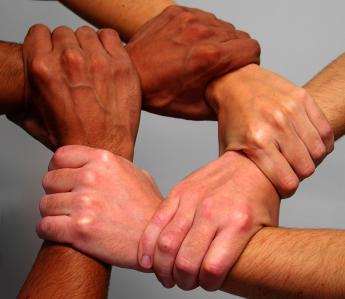 A reader wrote recently to say that my previous post (No ‘I’ in ‘CHURCH’–How American Evangelicalism Gets Its Pronouns Wrong) mirrored the collectivist thinking found in error-ridden cults and the teachings of New Age gurus. While I would argue that the actual teachings of such people are, in fact, largely about self-actualization rather than group actualization, if there is any guilt here, it is by association alone (ha, ha).
A reader wrote recently to say that my previous post (No ‘I’ in ‘CHURCH’–How American Evangelicalism Gets Its Pronouns Wrong) mirrored the collectivist thinking found in error-ridden cults and the teachings of New Age gurus. While I would argue that the actual teachings of such people are, in fact, largely about self-actualization rather than group actualization, if there is any guilt here, it is by association alone (ha, ha).
Here is truth: The entire narrative of Scripture is geared to a group. The story of God working is a story of Him working among a people. If anything, the words of Scripture should disabuse us of any notion that at the heart of it is the individual. What God is doing in the world has always been a “group project,” and if anything, the individual finds his or her truest expression of fullness only within a group.
Rather than give a million verses to back up this reality of the group, I will sketch out the ideas. Anyone who wants to fill in the blanks is setting himself or herself up for a tremendous journey into the mind and heart of God, and I would fully encourage anyone reading this to use it as a basis of further study.
The greatest lie afflicting the Church today is that you or I can do life alone. As we will see, in the eyes of God alone is never a good state of being.
The positive illustrations (the group):
God is a trinity. The Trinity exists in perfect commune within itself, Father, Son, and Holy Spirit.
God has made Man in that same image.
God creates the male and says of him, “It is not good that man should be alone.” God creates a female partner for the male. God’s first charge to them is to be fruitful, multiply, and fill the earth.
When mankind sinned, God saved from destruction an extended family. Prior to that destruction, He told that family to gather together groups of fertile creatures capable of recreating their own animal families that would continue the original fruitfulness command of God in the Garden.
When God chose to express His purpose for mankind, He chose a group model. He chose Abraham, to whom His promise would be that Abraham’s descendants would be like the stars in heaven. God’s promise is that Abraham will not be just Abraham but a great nation. Abraham finds comfort in knowing that he will not be alone.
God is referred to as “God of Abraham, Isaac, and Jacob.”
The exodus from Egypt left no Hebrew behind but removed an entire nation from the land.
The nation of Israel is established as a collective whole among which God dwells.
The joy of the barren Hannah is that God granted her a son, completing her family, and Samuel became a great leader of the nation.
Blessed is the man who has a “quiver full” of children.
Elijah’s mistaken belief that he is the last prophet of God left, but God said He has preserved a remnant.
Imagery of streams that bring life to an entire region, of the fruitfulness of the land that is overflowing, of the the abundance of God’s provision.
The threefold cord is not quickly broken.
Iron sharpens iron.
The Christ is revealed to a group that consists of the lowliest and the highest within society, abolishing class distinctions. Christ says He comes to establish a Kingdom and says that all are equal within the Kingdom of God.
Christ taking on a group of disciples.
Christ noting anyone who does His will is His brother, sister, or mother. His noting that there will be no hierarchies among those who believe in Him.
Followers of Christ depicted as a flock. The Good Shepherd understanding that the flock is not complete if even one sheep is missing from it.
“Where two or three are gathered, there am I in the midst of them.”
The promise that even eunuchs will be made fruitful. The holy as the wheat.
Christ speaks of the vine with many branches.
Christ establishes the Church. The Church is grafted into the vine.
The first act of the Spirit-filled Church was to gather and make sure that no disparity of needs in the group existed, but that all had needs met. The early Church met together daily. “God added to their number daily”
The Body of Christ is composed of many parts, but the Body cannot function unless the parts are in sync, and no part is worthless.
The Holy Spirit gives gifts intended for the edification of the collective Body. Some gifts do not function correctly unless others contribute to them.
The New Testament Scriptures are addressed to the collective you. “Brothers.”
The Church, collective, is a royal priesthood and the Bride. The Church is made of living stones, built together into a collective edifice in which God dwells, the New Jerusalem.
The uncountable entirety of believers.
The marriage supper of the Lamb.
The negative illustrations (the individual, alone and disconnected):
Satan coming to tempt Eve, the lone individual, apart from her plurality with Adam and God.
“Adam, where are you?”
The barren woman. The desolate land. The alien. The eunuch. The wanderer. The leper. The blind man. The cripple.
“Everyone did what he thought was right in his own eyes.”
The splitting of Israel and Judah.
The prodigal son. The lost sheep. The fig tree devoid of figs.
The agony of Christ in His taking on the collected sins of the world alone, and His “Why have you forsaken me? ” cry of disconnection from the Trinity.
Being left out of the Book of Life.
Hell as separation from God.
***
If we do not understand that Christianity is the individual finding fulfillment in the collected Body of Christ and being made part of that vine, then we do not understand the Faith.
We must not care what the world or New Age gurus say. God establishes a group and He dwells in that group. There is no other reality. Everything in Scripture points to this.

 Today’s post is a tough word that may anger a few people. Asking people to give is always a tricky proposition. In the Church, it’s an even more sensitive issue because we have tied giving with our spirituality. Plenty of churches still exist where one’s piety is measured by how readily one ponies up the moolah.
Today’s post is a tough word that may anger a few people. Asking people to give is always a tricky proposition. In the Church, it’s an even more sensitive issue because we have tied giving with our spirituality. Plenty of churches still exist where one’s piety is measured by how readily one ponies up the moolah.